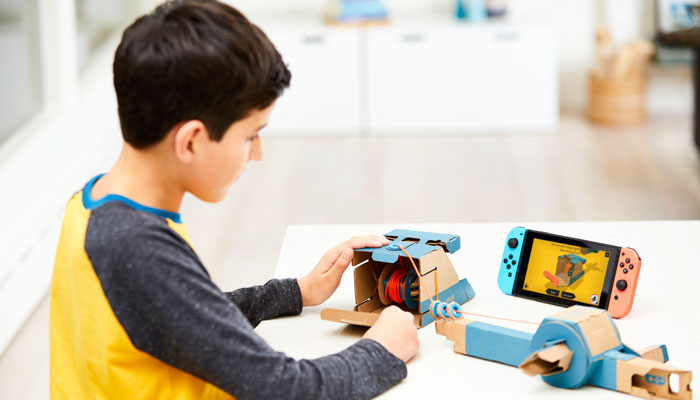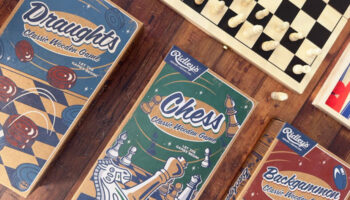Nintendo’s Labo will almost certainly be a sales success

Nintendo holds a peculiar status among the games press.
Even when the failing Wii U was at its lowest ebb, the company’s financial numbers were approaching crisis point and investors were calling for the head of its now late former president Satoru Iwata, writers continued to regard it with resolute affection. Now that the Switch has started so strongly and Nintendo is on the upward part of the bell curve, this affection has morphed into outright reverence.
Everything and anything Nintendo related is routinely celebrated, overly so on occasion. It commands a fan loyalty I’ve not seen with many other companies, even among professionals. This environment, however, engenders backlash. And thus, it’s hard to accurately gauge the reaction to any Nintendo announcements because so much of it is polarised – the believers proclaim them as the second coming of Christ, and in return the resistance force ramps up its dismissiveness (note that Nintendo loyalists will argue that they are the backlash against Nintendo negativity – an argument I don’t personally buy, but is undoubtedly often made).
So it has been with Nintendo Labo. For every dozen tweets excitedly declaring that Nintendo ‘has done it again’ you’ll find one poking fun at the company’s audacity for charging $80 for a cardboard box. One must wonder what the reaction would have been like if, say, Electronic Arts or Microsoft had made the announcement.
In reality, consumers aren’t paying $80 for just a cardboard box, of course. Ultimately Labo is about the software. That is what your money is buying. The cardboard accessories are a notable USP but also an attempt to tackle the problem that has forever plagued the video games peripherals market – and they might actually be a smart way of doing it.

As countless editorials in the wake of the Labo announcement have already pointed out, Nintendo is traditionally a toy company. Even modern Nintendo prefers to position itself in the toys and entertainment sector as opposed to video games. It is far more comfortable vying for position on a retailer’s shelf alongside VTech and LeapFrog than it is Sony and Microsoft.
Nintendo is also a company that is comfortable with innovation. It was the first to truly popularise home console gaming and it virtually invented portable console gaming. The d-pad on your Xbox or PlayStation controller? A Nintendo design. Shoulder buttons? Nintendo. Rumble technology? Wireless controllers? Thumbsticks? Yep, all Nintendo.
Labo, then, is in line with Nintendo’s core traditions. It also attempts to address a big sticking point – people don’t really want to pay for expensive peripherals. Guitar Hero and Rock Band were big hits in their time, but ultimately died away when consumers decided they weren’t keen on any more pricey plastic controllers that were only used for one game and took up a huge amount of space.
Labo only costs slightly more than standard game RRP, although how many cardboard accessories buyers are willing to tolerate in the living room or bedroom remains to be seen.
The other issue Nintendo faces is durability. There’s a reason we don’t make game controllers out of cardboard – they would break. With Labo so obviously designed to target younger audiences, we shall see how well its creations fare in the hands of enthusiastic children. Nintendo’s typically vigorous development testing will be important in this regard.
Undoubtedly the biggest test will be the games themselves. It will be the software that decides whether Labo is a success, and there are few companies you’d think have a better chance of creating bitesize experiences that justify Labo’s cost. Not that Nintendo has a flawless record – Wii Sports may have been a killer app for Wii (much as Tetris was for Game Boy and Super Mario Bros was for the NES), but the same cannot be said for either Wii U’s Nintendo Land or Switch’s 1-2 Switch.
One thing you can be certain of is that Labo will be a strong seller out of the gates. The Nintendo fanbase has never been stronger, and we’re still at the stage in the cycle where anything put out under the company name will be an instant sell-out (not least because Nintendo is never one to overstock). Whether Labo endures over time is another matter, but even if it’s just a flash in the pan that lasts a year or two, that’s not really a problem. An important craze doesn’t necessarily have to be a long-lasting one.
Labo seems a good fit for the Switch audience, and certainly offers up a tremendous amount of creative opportunity. It would be nice to see Nintendo open its doors to the innovative minds of the toy sector, too, although it’s traditional closed-door mentality might prevent that.
Ben Parfitt is a freelance writer, working in many sectors including video games and toys. You can reach him at [email protected] or at benparfitt.com.


























